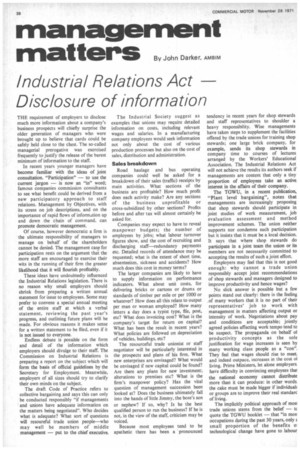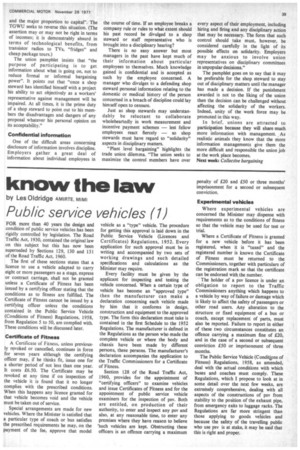management
Page 38

Page 39

If you've noticed an error in this article please click here to report it so we can fix it.
matters By John Darker, AMBIM
Industrial Relations Act Disclosure of information
THE requirement of employers to disclose much more information about a company's business prospects will chiefly surprise the older generation of managers who were brought up to believe that cards could be safely held close to the chest. The so-called managerial prerogative was exercised frequently to justify the release of the barest minimum of information to the staff.
In recent years younger managers have become familiar with the ideas of joint consultation. "Participation" — to use the current jargon — is now an "in" word; famous companies commission consultants to see what benefit could be derived from a new participatory approach to staff relations. Management by Objectives, with its stress on job descriptions, and on the importance of rapid flows of information up and down the chain of command, can promote democratic management.
Of course, however democratic a firm is the ultimate responsibility of managers to manage on behalf of the shareholders cannot be denied. The management case for participation rests on the argument that the more staff are encouraged to exercise their wits in the running of their firm the greater likelihood that it will flourish profitably.
These ideas have undoubtedly influenced the Industrial Relations legislation. There is no reason why small employers should shrink from preparing a written annual statement for issue to employees. Some may prefer to convene a special annual meeting of the entire staff at which a verbal statement, reviewing the past year's progress, and outlining future plans will be made. For obvious reasons it makes sense for a written statement to be filed, even if it is not issued to everyone.
Endless debate is possible on the form and detail of the information which employers should divulge to their staff. The Commission on Industrial Relations is preparing a report on the subject which will form the basis of official guidelines by the Secretary for Employment. Meanwhile, employers of all sizes should try to clarify their own minds on the subject.
The draft Code of Practice refers to collective bargaining and says this can only be conducted responsibly "if managements and unions have adequate information on the matters being negotiated". Who decides what is adequate? What sort of questions will resoureful trade union people—who may well be members of middle management — put to the chief executive. The Industrial Society suggest as examples that unions may require detailed information on costs, including relevant wages and salaries. In a manufacturing company employees would seek information not only about the cost of various production processes but also on the cost of sales, distribution and administration.
Sales breakdown Road haulage and bus operating companies could well be asked for a breakdown of their sales (traffic) receipts by main activities. What sections of the business are profitable? How much profit does each activity make? Are any sections of the business unprofitable or cross-subsidized by other sections? Profits before and after tax will almost certainly be asked for.
Companies may expect to have to reveal manpower budgets; the number of employees by jobs; what labour turnover figures show, and the cost of recruiting and discharging staff—redundancy payments etc. Detailed records of attendance may be requested; what is the extent of short time, absenteeism, sickness and accidents? How much does this cost in money terms?
The larger companies are likely to have to supply information on performance indicators. What about unit costs, for delivering bricks or cartons or drums or standards of timber per mile or per 1000 or whatever? How does all this relate to output per man or woman employed? How many letters a day does a typist type, file, post, etc? What does invoicing cost? What is the company's target for return on capital? What has been the result in recent years? What policies are followed on depreciation of vehicles, buildings, etc?
The resourceful trade unionist or staff negotiator will be particularly interested in the prospects and plans of his firm. What new enterprises are envisaged? What would be envisaged if new capital could be found? Are there any plans for new investment; alterations to premises etc? What is the firm's manpower policy? Has the vital question of management succession been looked at? Does the business ultimately fall into the hands of little Jimmy, the boss's son or nephew? If so, why? Is he the best qualified person to run the business? If he is not, in the view of the staff, criticism may be voiced.
Because most employees tend to be apathetic there has been a pronounced tendency in recent years for shop stewards and staff representatives to shoulder a heavy responsibility. Wise managements have taken steps to supplement the facilities offered by the trade unions for training shop stewards; one large brick company, for example, sends its shop stewards in company time to courses of lectures arranged by the Workers' Educational Association. The Industrial Relations Act will not achieve the results its authors seek if managements are content that only a tiny proportion of employees take an active interest in the affairs of their company.
The TGWU, in a recent publication, "Plant level bargaining", notes that managements are increasingly proposing that shop stewards should participate in joint studies of work measurement, job evaluation assessment and method improvement schemes. The union neither supports nor condemns such participation but it insists that it must be a local decision. It says that where shop stewards do participate in a joint team the union or its members are not necessarily committed to accepting the results of such a joint effort.
Employers may feel that this is not good enough: why cannot a trade union responsibly accept joint recommendations of shop stewards and managers designed to improve productivity and hence wages?
No slick answer is possible but a few points stand out clearly: there is the feeling .of many workers that it is no part of their representatives' job to work with management in matters affecting output or intensity of work. Negotiations about pay and conditions are acceptable; jointly agreed policies affecting work tempo tend to be suspect. The propaganda on behalf of productivity concepts as the sole justification for wage increases is seen by many working class people as a "con". They feel that wages should rise to meet, and indeed outpace, increases in the cost of living. Prime Ministers, let alone employers. have difficulty in convincing employees thai the national economy cannot distribute more than it can produce: in other words, the cake must be made bigger if individuali or groups are to improve their real standare of living.
The implicitly political approach of most trade unions stems from the belief — tc quote the TGWU booklet — that "in mos' occupations during the past 30 years, only small proportion of the benefits o: technological change have gone to labour
and the major proportion to capital". The TGWU seeks to reverse this situation. (The assertion may or may not be right in terms of incomes; it is demonstrably absurd in terms of technological benefits, from transistor radios to TVs, "fridges" and cheap package tours.) The union pamphlet insists that "the purpose of participating is to get information about what is going on, not to reduce formal or informal bargaining power". It points out that "once a shop steward has identified himself with a project his ability to act objectively as a workers' representative against management will be impaired. At all times, it is the prime duty of a shop steward to point out to his members the disadvantages and dangers of any proposal whatever his personal opinion on its acceptability."
Confidential information One of the difficult areas concerning disclosure of information involves discipline. Employers gather a great deal of information about individual employees in the course of time. If an employee breaks a company rule or rules to what extent should his past record be divulged to a shop steward or staff representative who is brought into a disciplinary hearing?
There is no easy answer but most managers in the past have kept much of their information about particular employees to themselves. Much knowledge gained is confidential and is accepted as such by the employee concerned. A manager who divulges to a defending shop steward personal information relating to the domestic or medical history of the person concerned in a breach of discipline could lay himself open to censure.
Just as shop stewards may understandably be reluctant to collaborate wholeheartedly in work measurement and incentive payment schemes — lest fellow employees react fiercely — so shop stewards must have regard to "solidarity" aspects in disciplinary matters.
"Plant level bargaining" highlights the trade union dilemma. "The union seeks to maximize the control members have over every aspect of their employment, including hiring and firing and any disciplinary action that may be necessary. The form that such control should take must, however, be considered carefully in the light of its possible effects on solidarity. Employers may be anxious to involve union representatives on disciplinary committees in unpopular decisions."
The pamphlet goes on to say that it may be preferable for the shop steward to stay out of disciplinary matters until the manager has made a decision. If the punishment awarded is not to the liking of the union then the decision can be challenged without affecting the solidarity of the workers. Indeed, unity of the work force may be promoted in this way.
In brief. unions arc attracted to participation because they will share much more information with management. As realistic animals they know that the more information managements give them the more difficult and responsible the union job at the work place becomes.
Next week: Collective bargaining


















































































